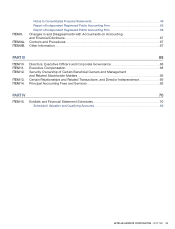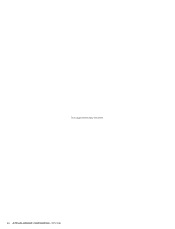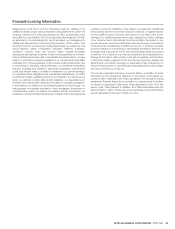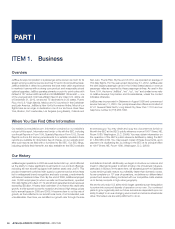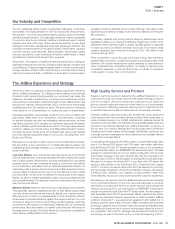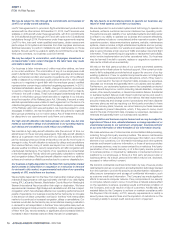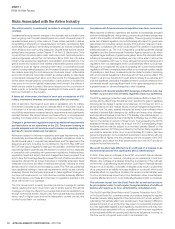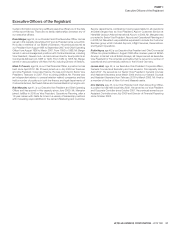JetBlue Airlines 2012 Annual Report Download - page 17
Download and view the complete annual report
Please find page 17 of the 2012 JetBlue Airlines annual report below. You can navigate through the pages in the report by either clicking on the pages listed below, or by using the keyword search tool below to find specific information within the annual report.JETBLUE AIRWAYS CORPORATION-2012 10K 13
PART I
ITEM 1Business
new rule, carriers and ticket agents are permitted to include a statement
informing customers of the base fare versus government taxes and fees,
but such a break-down cannot be more prominent than the advertised total
price. Failure to comply could result in fi nes and penalties by the DOT as
well as reputational damage, particularly in light of the substantial media
coverage on the new rule and the perception that total price advertising is
in the best interest of the customer. The DOT is reviewing whether certain
practices and advertising programs by JetBlue since January 2012 are in
compliance with the new rule and applicable guidance.
We believe we are operating in material compliance with DOT, FAA, TSA
and applicable international and foreign regulations and hold all necessary
operating and airworthiness authorizations and certifi cates. Should any of
these authorizations or certifi cates be modifi ed, suspended or revoked,
our business could be materially adversely affected.
We are also subject to state and local laws and regulations in a number
of states in which we operate.
The airline industry is one of the most heavily taxed in the U.S., with taxes
and fees accounting for approximately 16% of the total fare charged to a
customer. Airlines are obligated to fund all of these taxes and fees regardless
of their ability to pass these charges on to the customer. Additionally, if
the TSA were to change the way the Aviation Security Infrastructure Fee
is assessed, our security costs could be higher.
Airport Access. Historically, JFK, LaGuardia Airport, or LaGuardia, and
Ronald Reagan Washington National Airport in Washington D.C., or
Reagan National, were slot-controlled airports subject to the FAA’s “High
Density Rule,” which rule limited the air traffi c in and out of the airport
during specifi c times. For JFK and LaGuardia, those rules expired in 2007.
Following a signifi cant increase in air traffi c in and out of these airports,
in 2008, the FAA reinstated temporary rules limiting operations for JFK,
LaGuardia and Newark, N.J.’s Liberty International Airport, or Newark.
These temporary rules continue in effect today. Due to airspace congestion
in the northeast, especially in the New York metropolitan region, and during
inclement weather, delays at JFK, LaGuardia and Newark remain among
the highest in the nation.
At Reagan National where we increased our presence in 2012 and now
operate 18 daily departures to fi ve destinations, the High Density Rule
remains in place. We operate with slots permanently assigned to us as
well as with leased slots.
Westchester County Airport in White Plains, NY is also a slot-controlled
airport, although unlike JFK, LaGuardia, Newark and Reagan National, it
is governed by local, not federal regulations.We have 26 slots available
for use and currently operate 13 weekday round trip fl ights from White
Plains, NY to six destinations.
Long Beach (California) Municipal Airport is a slot-controlled airport as a
result of a 1995 court settlement. We have 32 slots available for use and
currently operate them to 12 domestic cities from coast to coast.
Environmental. We are subject to various federal, state and local laws
relating to the protection of the environment, including the discharge or
disposal of materials and chemicals and the regulation of aircraft noise
administered by numerous state and federal agencies.
The Airport Noise and Capacity Act of 1990 recognizes the right of airport
operators with special noise problems to implement local noise abatement
procedures as long as those procedures do not interfere unreasonably
with the interstate and foreign commerce of the national air transportation
system. Certain airports, including San Diego and Long Beach, California,
have established restrictions to limit noise which can include limits on the
number of hourly or daily operations and the time of such operations.
These limitations serve to protect the local noise-sensitive communities
surrounding the airport. Our scheduled fl ights at Long Beach and San Diego
are in compliance with the noise curfew limits but when we experience
irregular operations, on occasion, we may violate these curfews. We have
agreed to a payment structure with the Long Beach City Prosecutor for
any violations which we pay quarterly to the Long Beach Public Library
Foundation. The payment is based on the number of infractions in the
preceding quarter. This local ordinance has not had, and we believe it will
not have, a negative effect on our operations.
We use our “Jetting to Green” program on www.jetblue.com to educate
our customers and Crewmembers about environmental issues and to
inform the public about our environmental protection initiatives. Our most
recent corporate sustainability report for the years 2010-2011 is available
on our website and addresses our environmental programs, including
those aimed at curbing greenhouse emissions, our conservation efforts
and our social responsibility efforts.
Foreign Operations. International air transportation is subject to extensive
government regulation. The availability of international routes to U.S. carriers
is regulated by treaties and related agreements between the United States
and foreign governments. We currently operate international service to
the Bahamas, the Dominican Republic, Bermuda, Aruba, the Netherlands
Antilles, Mexico, Colombia, Costa Rica, Jamaica, Barbados, Saint Lucia,
the Turks and Caicos Islands and the Cayman Islands. To the extent we
seek to provide air transportation to additional international markets in the
future, we would be required to obtain necessary authority from the DOT
and the applicable foreign government.
Foreign Ownership. Under federal law and the DOT regulations, we must
be controlled by United States citizens. In this regard, our president and at
least two-thirds of our board of directors must be United States citizens
and not more than 24.99% of our outstanding common stock may be
voted by non-U.S. citizens. We believe we are currently in compliance
with these ownership provisions.
Other Regulations. All air carriers are also subject to certain provisions
of the Communications Act of 1934 because of their extensive use of
radio and other communication facilities, and are required to obtain an
aeronautical radio license from the FCC. To the extent we are subject to
FCC requirements, we will take all necessary steps to comply with those
requirements. Our labor relations are covered under Title II of the Railway
Labor Act of 1926 and are subject to the jurisdiction of the National Mediation
Board. In addition, during periods of fuel scarcity, access to aircraft fuel
may be subject to federal allocation regulations. We are also subject to
state and local laws and regulations at locations where we operate and
the regulations of various local authorities operating the airports we serve.
Civil Reserve Air Fleet. We are a participant in the Civil Reserve Air
Fleet Program, which permits the United States Department of Defense
to utilize our aircraft during national emergencies when the need for
military airlift exceeds the capability of military aircraft. By participating in
this program, we are eligible to bid on and be awarded peacetime airlift
contracts with the military.
Insurance
We carry insurance of types customary in the airline industry and at amounts
deemed adequate to protect us and our property and to comply both
with federal regulations and certain of our credit and lease agreements.
As a result of the terrorist attacks of September11, 2001 (the Terrorist
Attacks), aviation insurers signifi cantly reduced the amount of insurance
coverage available to commercial air carriers for liability to persons other
than employees or passengers for claims resulting from acts of terrorism,
war or similar events (war-risk coverage). At the same time, these insurers
signifi cantly increased the premiums for aviation insurance in general. The
U.S.government has agreed to provide commercial war-risk insurance
for U.S.based airlines, currently through September30, 2013, covering
losses to employees, passengers, third parties and aircraft. We currently
have such coverage in addition to our overall hull and liability insurance
coverage. If the U.S.government were to cease providing such insurance
in whole or in part, it is likely we would be able to obtain comparable
coverage in the commercial market, but we would likely incur higher
premiums and more restrictive terms.


